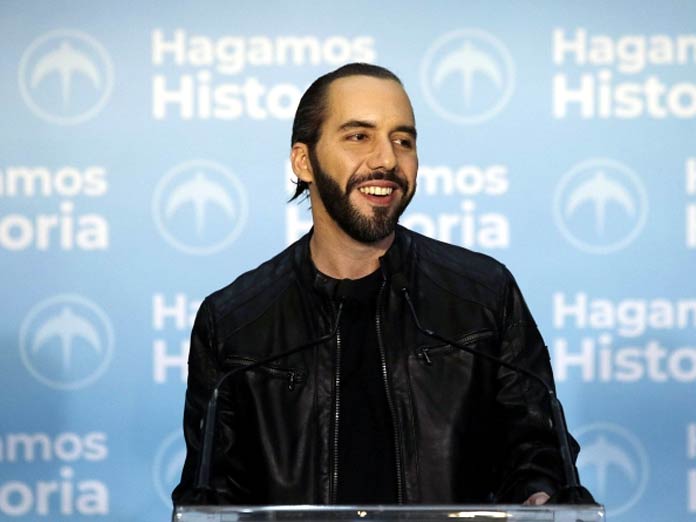Live
- Ajith’s ‘Good Bad Ugly’ set for April release
- Digital Personal Data Protection Rules prioritise India's citizen-centric governance: PM Modi
- Parvati is a complex character with many shades: Anjali on her role in ‘Game Changer’
- MRPL’s CSR Initiative Boosts Eye Care at Wenlock Hospital
- APSRTC Announces 7,200 Special Buses for Sankranti Festival Travel
- ‘Kanguva’ make the cut for Oscars
- Microsoft to Train 10 Million Indians in AI Skills by 2030
- ‘Pushpa 2’ shatters records; becomes highest-grossing Indian film of all time
- ‘Sankranthiki Vasthunam’ trailer: Blends fun and thrills
- Mental Health at Work: Supporting Neurodiverse Employees for Inclusive Growth
Just In

Salvadorans on Sunday elected Nayib Bukele, the popular former mayor of San Salvador, as the Central American countrys new president a result that ends the near 30year grip on power of its two largest parties
SAN SALVADOR: Salvadorans on Sunday elected Nayib Bukele, the popular former mayor of San Salvador, as the Central American country's new president -- a result that ends the near 30-year grip on power of its two largest parties.
"At this moment we can announce with total certainty that we have won the presidency," the 37-year-old Bukele, of the conservative Grand Alliance for National Unity (GANA) party, told supporters late Sunday.
A few minutes earlier, the country's Supreme Electoral Tribunal (TSE) had awarded him 52.93 percent of the vote with almost 70 percent of ballots counted. It went on to announce preliminary results gave Bukele an "irreversible" lead of 53.78 percent of votes with 87.67 percent counted.
Bukele has promised to increase investment in education and fight corruption -- but his main task will be to implement new programs to confront insecurity.
He will also have to form an alliance with the right, which dominates congress.
Bukele's opponents -- Carlos Calleja of the right-wing Nationalist Republican Alliance (ARENA), and Hugo Martinez of the leftist Farabundo Marti Front for National Liberation (FMLN) -- recognized the win. For nearly three decades, their parties have had a firm hold on Salvadoran politics.
"We recognize the results of these elections. We are going to call the president-elect to wish him luck in facing the challenges in this country," said Calleja, the runner-up. The FMLN's Martinez took third place.
Long lines
Some 5.2 million people participated in the election, according to the elections authority chief Julio Olivo.
Voters formed long lines outside polling stations in parts of the capital, where gang-violence and insecurity are endemic. El Salvador is among the world's most violent countries with a murder rate of 51 per 100,000 citizens.
"It's honestly scary to go out alone in the street, you never know what can happen you," first-time voter Gabriela Solorzano said at a polling station in the gang stronghold of Mejicanos in the north of the capital, her brother holding her hand.
"So I think whoever wins this election should care about us young people, give us more security as there is so much violence," said Solorzano, 19.
Ligia Mejia, 21, a pharmacy chain employee wearing her work uniform, was concerned about high unemployment fuelling migration.
"Hopefully, the new president will be aware that more jobs are needed, because it is very difficult to get a job for the first time," she said.
In nearby streets, where graffiti on the walls testify to the presence of criminal gangs, many people arrived to vote aboard buses laid on by the political parties.
Outgoing President Salvador Sanchez Ceren said voting proceeded "very calmly and very normally."
Some 23,000 police officers and 15,000 soldiers were deployed to protect the sixth presidential election since democracy was restored in 1992 -- after 12 years of bloody civil war between state security forces and leftist guerrillas.
Daring security solutions
El Salvador has been battered by gang violence, which authorities say was the source of most of the 3,340 murders reported last year.
Gangs are said to have 70,000 members, 17,000 of whom are behind bars.
"The new president must offer daring security solutions," Carlos Carcach, an analyst and professor at the Higher School of Economy and Business in El Salvador, told AFP.
Another challenge will be to reduce illegal immigration to the United States -- given President Donald Trump has threatened to cut off aid if the stream of Central American migrants heading there is not stopped.
During the last few months of 2018, more than 3,000 Salvadorans joined caravans marching towards the United States, fleeing gangs and a lack of jobs.
"You think and rethink about whether or not it's worth staying in this country or have the courage to go and try your luck in another," Sergio Hernandez, a 41-year-old carpenter told AFP.
"It's terrible with the gangs, someone has to do something because it's unbearable."
The other main worry for Salvadorans is the economy. Although it grew by 2.6 percent in 2018, its biggest rise in five years, that is considered insufficient to cover the demand for new employment.
Bukele will have to juggle the need to raise taxes to cover an external debt of more than $9.5 billion while trying to maintain social programs in a country where the minimum wage of $300 a month is barely enough to buy food.
"The challenge for the new leader is to satisfy the demand for fairer salaries and avoid the social exclusion that forces many to flee the country," said Raul Moreno, an economics professor at the University of El Salvador.
Just over 30 percent of El Salvador's 6.6 million inhabitants live below the poverty line.

© 2024 Hyderabad Media House Limited/The Hans India. All rights reserved. Powered by hocalwire.com







